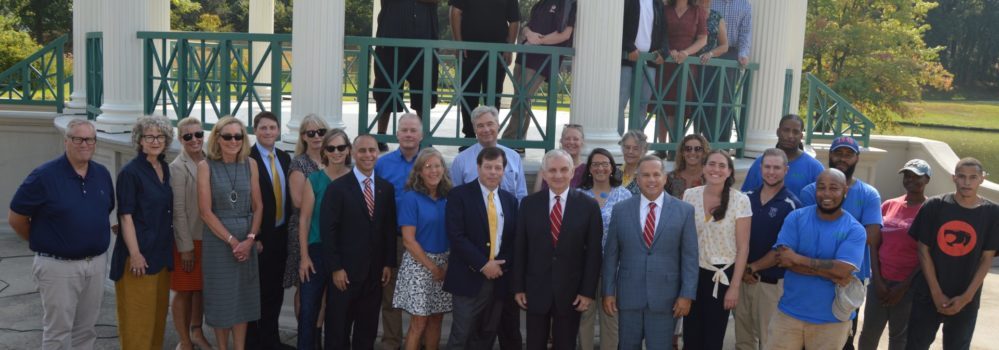
Announcing grants for coastal conservation and restoration in Southeast New England

With the support of Senator Jack Reed, Restore America’s Estuaries (RAE) and the U.S. Environmental Protection Agency (EPA) are awarding $2.3 million in new funding to local organizations working for clean water and healthy coastal ecosystems in Southeast New England. On Sept. 23, Rhode Island grantees were announced at an event at Roger Williams Park in Providence, with a speaking program featuring Senators Jack Reed and Sheldon Whitehouse, Congressman David Cicilline, Mayor Jorge Elorza of Providence, and other federal, state and municipal officials. A companion event at the Waquoit Bay National Estuarine Research Reserve in East Falmouth, MA, announced Massachusetts grantees, with remarks by Congressman Bill Keating, EPA Regional Administrator Dennis Deziel, and others.
The funding is provided under the 2019 Southeast New England Program (SNEP) Watershed Grants, a collaboration between RAE and EPA Region 1. The grant program builds and supports partnerships that tackle the region’s most pressing environmental issues, such as nutrient pollution and coastal habitat loss.
For 2019, RAE selected 13 grant recipients in Rhode Island and Massachusetts through a rigorous competitive process. The awardees include municipalities, non-profit organizations, and academic institutions, each of which is leading an innovative, high-impact project of regional importance. The $2.3 million in federal funding for the region will be matched by an additional $800,000 in state and local dollars – providing, in total, more than $3.1 million in funds to protect and restore Southeast New England’s environment.
“We’ve come a long way in terms of cleaning up Narragansett Bay and improving water quality, but we still have a long way to go. It’s crucial we keep these funds flowing so we can restore more coastal watersheds and support local communities,” said Senator Reed. “These grants will provide tangible benefits for our waterways and communities, and I am pleased they are being put to good use.”
By funding locally based partnerships that are working to reduce pollution and restore coastal habitats, the SNEP Watershed Grants program is helping to ensure a sustainable and prosperous future for Southeast New England communities. For more about SNEP Watershed Grants, see www.snepgrants.org.
In Rhode Island, the 2019 SNEP Watershed Grants are providing $1.1 million to seven local partnerships led by the following organizations:
- Audubon Society of Rhode Island to create a regional center for stormwater innovation at Roger Williams Park in Providence ($177,534);
- City of Cranston to restore clean water at Spectacle Pond, with benefits to Roger Williams Park and the Pawtuxet River system ($187,500);
- Groundwork Rhode Island to install stormwater improvements in Providence and provide job training for urban youth ($198,891);
- City of Newport to implement an innovative approach to reducing urban stormwater by providing incentives to private property owners ($108,750);
- Northern Rhode Island Conservation District to establish a manure management program for small farmers in the Scituate Reservoir watershed, reducing pollution to Providence’s drinking water supply ($113,976);
- Town of Warren to install innovative stormwater practices on waterfront streets to reduce pollution to Narragansett Bay ($25,000); and
- Woonasquatucket River Watershed Council to install stormwater practices along the Woonasquatucket River Greenway, reducing pollution to the Providence River and Narragansett Bay ($245,000).
In Massachusetts, the 2019 SNEP Watershed Grants are providing $1.2 million to six local partnerships led by the following organizations:
- Association to Preserve Cape Cod: $245,000 for the Three Bays Stormwater Project, supporting the design and installation of stormwater management practices to restore clean water to three estuaries in Barnstable. This grant continues funding provided to APCC by SNEP Watershed Grants in 2018.
- Buzzards Bay Coalition: $223,533 for Promoting Salt Marsh Resilience, supporting research to better understand causes and trends of marsh loss on Buzzards Bay, as well as pilot-scale restoration activities to preserve threatened marshes.
- Falmouth Rod & Gun Club: $245,000 for Upper Childs River & Bog Restoration, an innovative project to restore natural wetlands and trout habitat in three abandoned cranberry bogs in Falmouth. This grant continues funding provided to FRGC by SNEP Watershed Grants in 2018.
- Mass. Maritime Academy: $176,581 for Buzzards Bay Stormwater Collaborative, a new and important partnership between MMA and eight Buzzards Bay municipalities. Students will support communities in stormwater compliance, integrated with a new MMA curriculum.
- Woods Hole Oceanographic Institution: $298,598 for Permeable Reactive Barriers – research and testing of an innovative technology to reduce nitrogen pollution by intercepting groundwater as it flows into coastal waters.
- Buzzards Bay Coalition: $27,695 for Prevent Nutrient Pollution from Composting, which will assist communities in reducing nutrient pollution to coastal waters from new composting facilities recently required by Massachusetts law.
Thomas Ardito is the Southeast New England Watershed Grant Program manager at Restore America’s Estuaries.
